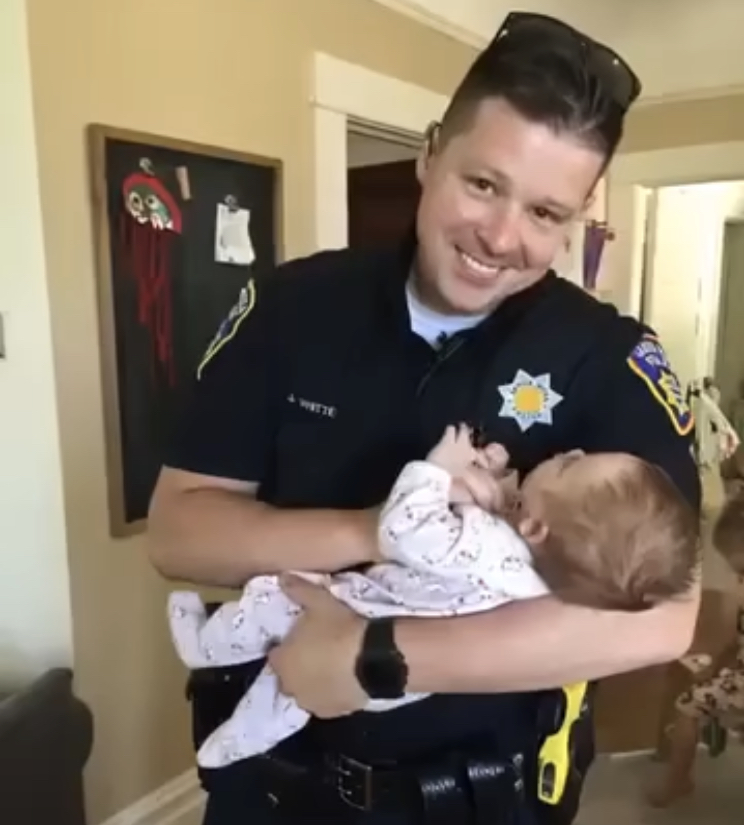Officer James Carter had seen many things during his 15 years on the police force, but nothing could have prepared him for what he discovered that chilly autumn morning. As dawn’s first light began to creep over the horizon, casting a golden hue over the quiet suburban streets, Officer Carter was on his routine patrol. The air was crisp, and the leaves crunched under the tires of his squad car.
As he drove past an alley, something unusual caught his eye. A slight movement emanated from a large, dented trash can tucked behind an abandoned building. Instinct and training kicked in, and he decided to investigate. Stepping out of his vehicle, his breath visible in the cold air, Officer Carter cautiously approached the trash can, his hand instinctively resting on his holstered weapon.
What he found inside would change the course of his life forever. Wrapped in a tattered blanket, a tiny baby lay nestled among the refuse, its small, pink fists waving weakly. The infant was whimpering softly, its cries drowned by the sounds of the city awakening. Officer Carter’s heart lurched in his chest. Without hesitation, he scooped the baby into his arms, cradling it gently.
The sequence of events that followed was a blur of activity. Paramedics arrived within minutes, ensuring the baby was stable and unharmed, while Officer Carter provided his account to fellow officers. The infant was taken to a nearby hospital, where it was confirmed to be healthy but in need of care and, most importantly, a home.
As Officer Carter sat in his patrol car, the adrenaline subsiding, a thought took hold of him. He wanted to raise this child. The idea blossomed into an overwhelming desire; he felt a deep connection to the tiny life he had saved. But when he broached the topic with his wife, Emily, that evening, he was met with resistance.
“No, James,” she said firmly, shaking her head. “We can’t just suddenly decide to adopt a baby. It’s a huge responsibility, and we need to think it through.”
Disappointment washed over him, but he understood her concerns. They had two children of their own, and taking on a third, especially under these circumstances, was not something to be done on a whim. Yet, the image of the helpless baby haunted him.
The following weeks passed with an aching slowness. The baby, whom the hospital staff had nicknamed “Hope,” remained in the system, waiting for a foster home. Officer Carter visited regularly, feeling a growing attachment with each visit. Emily noticed the change in him, the way his eyes lit up when he spoke of Hope, and it tugged at her heartstrings.
Then, the incident happened—the catalyst that would alter their lives permanently. One evening, Emily was driving home from work when she witnessed a car accident. A van had flipped over after colliding with another vehicle. Without thinking, she rushed to help, pulling a young girl from the wreckage. The gratitude and relief she saw in the girl’s eyes mirrored what she imagined Officer Carter had seen in little Hope’s.
That night, Emily sat in silence, contemplating her experience. She realized that sometimes, life presented opportunities to make a difference, to extend love and compassion in unexpected ways. The next morning, she approached James, her resolve firm. They would open their home to baby Hope.
Together, they navigated the adoption process, their resolve strengthening with each hurdle. The day they brought Hope home was filled with joy and promises of a new beginning. Officer Carter felt a profound sense of fulfillment, knowing they had turned a moment of tragedy into a story of hope and love.
In saving Hope, they discovered that family was not just about blood—it was about the bonds forged through acts of kindness and courage, a lesson that would resonate with them for the rest of their lives.

